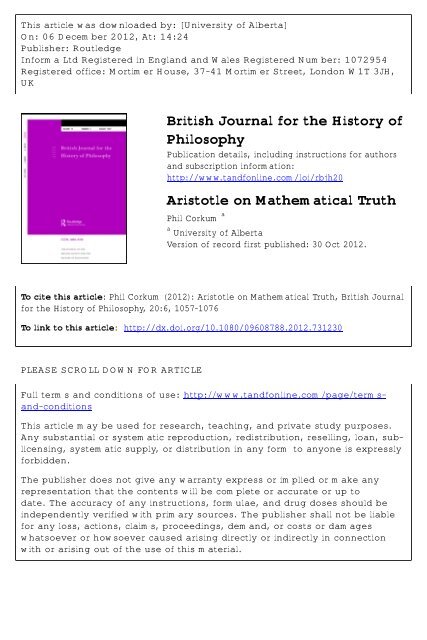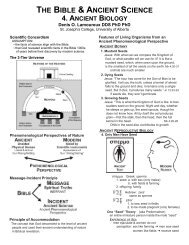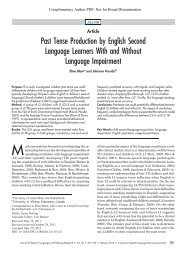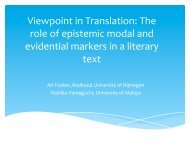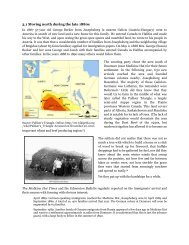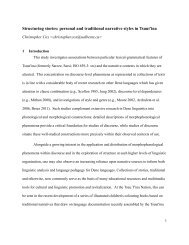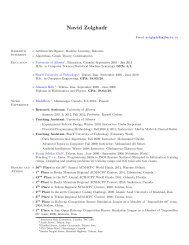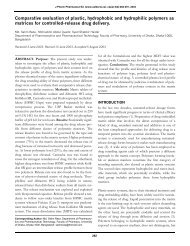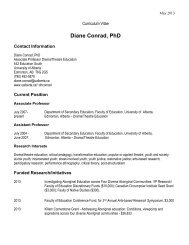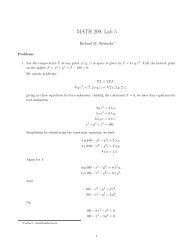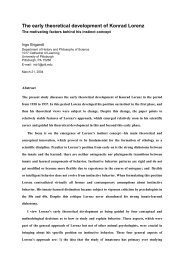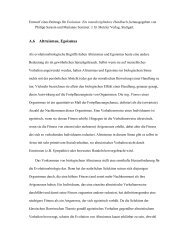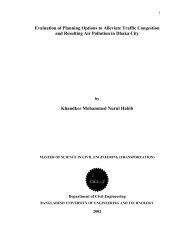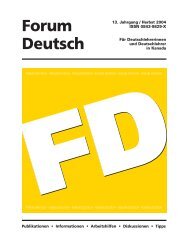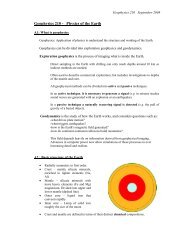Aristotle on Mathematical Truth - University of Alberta
Aristotle on Mathematical Truth - University of Alberta
Aristotle on Mathematical Truth - University of Alberta
Create successful ePaper yourself
Turn your PDF publications into a flip-book with our unique Google optimized e-Paper software.
This article was downloaded by: [<strong>University</strong> <strong>of</strong> <strong>Alberta</strong>]<br />
On: 06 December 2012, At: 14:24<br />
Publisher: Routledge<br />
Informa Ltd Registered in England and Wales Registered Number: 1072954<br />
Registered <strong>of</strong>fice: Mortimer House, 37-41 Mortimer Street, L<strong>on</strong>d<strong>on</strong> W1T 3JH,<br />
UK<br />
British Journal for the History <strong>of</strong><br />
Philosophy<br />
Publicati<strong>on</strong> details, including instructi<strong>on</strong>s for authors<br />
and subscripti<strong>on</strong> informati<strong>on</strong>:<br />
http://www.tandf<strong>on</strong>line.com/loi/rbjh20<br />
<str<strong>on</strong>g>Aristotle</str<strong>on</strong>g> <strong>on</strong> <strong>Mathematical</strong> <strong>Truth</strong><br />
Phil Corkum a<br />
a <strong>University</strong> <strong>of</strong> <strong>Alberta</strong><br />
Versi<strong>on</strong> <strong>of</strong> record first published: 30 Oct 2012.<br />
To cite this article: Phil Corkum (2012): <str<strong>on</strong>g>Aristotle</str<strong>on</strong>g> <strong>on</strong> <strong>Mathematical</strong> <strong>Truth</strong>, British Journal<br />
for the History <strong>of</strong> Philosophy, 20:6, 1057-1076<br />
To link to this article: http://dx.doi.org/10.1080/09608788.2012.731230<br />
PLEASE SCROLL DOWN FOR ARTICLE<br />
Full terms and c<strong>on</strong>diti<strong>on</strong>s <strong>of</strong> use: http://www.tandf<strong>on</strong>line.com/page/termsand-c<strong>on</strong>diti<strong>on</strong>s<br />
This article may be used for research, teaching, and private study purposes.<br />
Any substantial or systematic reproducti<strong>on</strong>, redistributi<strong>on</strong>, reselling, loan, sublicensing,<br />
systematic supply, or distributi<strong>on</strong> in any form to any<strong>on</strong>e is expressly<br />
forbidden.<br />
The publisher does not give any warranty express or implied or make any<br />
representati<strong>on</strong> that the c<strong>on</strong>tents will be complete or accurate or up to<br />
date. The accuracy <strong>of</strong> any instructi<strong>on</strong>s, formulae, and drug doses should be<br />
independently verified with primary sources. The publisher shall not be liable<br />
for any loss, acti<strong>on</strong>s, claims, proceedings, demand, or costs or damages<br />
whatsoever or howsoever caused arising directly or indirectly in c<strong>on</strong>necti<strong>on</strong><br />
with or arising out <strong>of</strong> the use <strong>of</strong> this material.
Downloaded by [<strong>University</strong> <strong>of</strong> <strong>Alberta</strong>] at 14:24 06 December 2012<br />
British Journal for the History <strong>of</strong> Philosophy 20(6) 2012: 1057–1076<br />
ARTICLE<br />
ARISTOTLE ON MATHEMATICAL TRUTH<br />
Phil Corkum<br />
Both literalism, the view that mathematical objects simply exist in the<br />
empirical world, and ficti<strong>on</strong>alism, the view that mathematical objects do<br />
not exist but are rather harmless ficti<strong>on</strong>s, have been both ascribed to<br />
<str<strong>on</strong>g>Aristotle</str<strong>on</strong>g>. The ascripti<strong>on</strong> <strong>of</strong> literalism to <str<strong>on</strong>g>Aristotle</str<strong>on</strong>g>, however, commits<br />
<str<strong>on</strong>g>Aristotle</str<strong>on</strong>g> to the unattractive view that mathematics studies but a small<br />
fragment <strong>of</strong> the physical world; and there is evidence that <str<strong>on</strong>g>Aristotle</str<strong>on</strong>g><br />
would deny the literalist positi<strong>on</strong> that mathematical objects are<br />
perceivable. The ascripti<strong>on</strong> <strong>of</strong> ficti<strong>on</strong>alism also faces a difficult<br />
challenge: there is evidence that <str<strong>on</strong>g>Aristotle</str<strong>on</strong>g> would deny the ficti<strong>on</strong>alist<br />
positi<strong>on</strong> that mathematics is false. I argue that, in <str<strong>on</strong>g>Aristotle</str<strong>on</strong>g>’s view, the<br />
ficti<strong>on</strong> <strong>of</strong> mathematics is not to treat what does not exist as if existing<br />
but to treat mathematical objects with an <strong>on</strong>tological status they lack.<br />
This form <strong>of</strong> ficti<strong>on</strong>alism is c<strong>on</strong>sistent with holding that mathematics is<br />
true.<br />
KEYWORDS: <str<strong>on</strong>g>Aristotle</str<strong>on</strong>g>; mathematics; truth; ficti<strong>on</strong>alism; literalism<br />
Do mathematical objects exist in some realm inaccessible to our senses? It<br />
may be tempting to deny this. For how could we come to know<br />
mathematical truths, if such knowledge must arise from causal interacti<strong>on</strong><br />
with n<strong>on</strong>-empirical objects? However, denying that mathematical objects<br />
exist altogether has unsettling c<strong>on</strong>sequences. If you deny the existence <strong>of</strong><br />
mathematical objects, then you must reject all claims that commit you to<br />
such objects, which would seem to mean rejecting as false much <strong>of</strong><br />
mathematics. For, as David Papineau (1990) vividly puts it, it is doublethink<br />
to deny that mathematical objects exist but to c<strong>on</strong>tinue to believe, for<br />
example, that there are two prime numbers between ten and fifteen. Two<br />
current resp<strong>on</strong>ses to this problem are literalism and ficti<strong>on</strong>alism. Both<br />
literalists and ficti<strong>on</strong>alists deny the existence <strong>of</strong> a world <strong>of</strong> mathematical<br />
objects distinct from the empirical world. But they differ markedly in this<br />
denial. Literalists argue that mathematical objects simply exist in the<br />
empirical world; <strong>on</strong> this account, mathematical asserti<strong>on</strong>s assert true beliefs<br />
about perceivable objects. Ficti<strong>on</strong>alists, <strong>on</strong> the other hand, hold that, strictly<br />
British Journal for the History <strong>of</strong> Philosophy<br />
ISSN 0960-8788 print/ISSN 1469-3526 <strong>on</strong>line ª 2012 BSHP<br />
http://www.tandf<strong>on</strong>line.com http://dx.doi.org/10.1080/09608788.2012.731230
Downloaded by [<strong>University</strong> <strong>of</strong> <strong>Alberta</strong>] at 14:24 06 December 2012<br />
1058 PHIL CORKUM<br />
speaking, mathematical objects do not exist at all, and so exist in neither the<br />
empirical world nor in some realm distinct from the empirical world. They<br />
argue that mathematical objects are not actual objects but rather harmless<br />
ficti<strong>on</strong>s; <strong>on</strong> this account, mathematical asserti<strong>on</strong>s do not assert true beliefs<br />
about the world but merely ficti<strong>on</strong>al attitudes.<br />
Although these two positi<strong>on</strong>s are apparently quite opposed to <strong>on</strong>e<br />
another, they n<strong>on</strong>etheless have been both ascribed to <str<strong>on</strong>g>Aristotle</str<strong>on</strong>g>. Indeed,<br />
<str<strong>on</strong>g>Aristotle</str<strong>on</strong>g>’s philosophy <strong>of</strong> mathematics seems to exhibit some <strong>of</strong> the features<br />
characteristic <strong>of</strong> literalism and some <strong>of</strong> the features characteristic <strong>of</strong><br />
ficti<strong>on</strong>alism. However, <str<strong>on</strong>g>Aristotle</str<strong>on</strong>g>’s positi<strong>on</strong> also exhibits features interestingly<br />
different from both positi<strong>on</strong>s. I will begin by quickly surveying the<br />
variety <strong>of</strong> descripti<strong>on</strong>s which <str<strong>on</strong>g>Aristotle</str<strong>on</strong>g> uses to characterize the relati<strong>on</strong><br />
between mathematical objects and the perceivable world. This will help to<br />
explain how these apparently opposed positi<strong>on</strong>s have been ascribed to<br />
<str<strong>on</strong>g>Aristotle</str<strong>on</strong>g>. There are three classes <strong>of</strong> descripti<strong>on</strong>s.<br />
(1) The use <strong>of</strong> qua ( ) as the adverbial modificati<strong>on</strong> <strong>of</strong> a verb <strong>of</strong><br />
c<strong>on</strong>siderati<strong>on</strong>. 1 One such use is in a negative or, less comm<strong>on</strong>ly,<br />
positive descripti<strong>on</strong> with the object <strong>of</strong> c<strong>on</strong>siderati<strong>on</strong> sensible (or mobile<br />
or physical) things. Thus Meta. M.3 (1077b20ff.):<br />
clearly it is possible that there should also be both propositi<strong>on</strong>s and<br />
dem<strong>on</strong>strati<strong>on</strong>s about sensible magnitudes, not however qua sensible but<br />
qua possessed <strong>of</strong> certain definite qualities. . .. and in the case <strong>of</strong> mobiles<br />
there will be propositi<strong>on</strong>s and sciences, which treat them however not qua<br />
mobile but <strong>on</strong>ly qua bodies, or again <strong>on</strong>ly qua planes, or <strong>on</strong>ly qua lines, or<br />
qua divisibles, or qua indivisibles having positi<strong>on</strong>, or <strong>on</strong>ly qua indivisibles. 2<br />
The other use <strong>of</strong> is in a positive descripti<strong>on</strong> with the object <strong>of</strong><br />
c<strong>on</strong>siderati<strong>on</strong> mathematical. These uses <strong>of</strong> regularly modify the<br />
mathematical as separate; I will c<strong>on</strong>sider this use in more detail in<br />
c<strong>on</strong>juncti<strong>on</strong> with the class <strong>of</strong> separati<strong>on</strong> descripti<strong>on</strong>s, below. For<br />
example, see Meta. E.1 (1026a9–10): ‘it is clear that some branches <strong>of</strong><br />
mathematics are c<strong>on</strong>sidered as immovable and separate (woristþ).’ 3<br />
1 yEorEi 7 n: Meta. E.1 (1026a10), K.3 (1061a35ff.), M.3 (1078a24ff.). Cf. noEi 7 n: De An. III.7<br />
(431b15); sko/Ei 7 n: Phys. II.2 (194a10); /ragmatEœEsyai: Phys. II.2 (193b31); zZtEi 7 n: Meta.<br />
E.1 (1025b1); E’ndE 0 wEsyai /Erí: Meta. M.3 (1977b21). With the use <strong>of</strong> oÐ n, not , De An. III.7<br />
(431b12).<br />
2 Translati<strong>on</strong>s based <strong>on</strong> those collected in McKe<strong>on</strong>, R., The Basic Works <strong>of</strong> <str<strong>on</strong>g>Aristotle</str<strong>on</strong>g> (New<br />
York: Random House, 1941). Cf. Phys. II.2 (194a9–12): ‘Geometry investigates physical lines<br />
but not qua physical.’ Ó mEn gàr gEomEtría Erì grammh ´<br />
n fnsikh ´<br />
fnsik¾. Also Meta. K.3. (1061a34).<br />
nskoEi, Þll’ ou; w<br />
3<br />
Cf. De An. III.7 (431b15–16); APo. I.18 (81b4–5). An excepti<strong>on</strong>, with in a negative<br />
descripti<strong>on</strong> with the object <strong>of</strong> c<strong>on</strong>siderati<strong>on</strong> mathematical, occurs at APo. I.13 (79a7–10); I will<br />
c<strong>on</strong>sider this passage in detail later.<br />
´
Downloaded by [<strong>University</strong> <strong>of</strong> <strong>Alberta</strong>] at 14:24 06 December 2012<br />
ARISTOTLE ON MATHEMATICAL TRUTH 1059<br />
(2) The sensible is abstracted from the mathematical. Here, two<br />
compounds <strong>of</strong> aºrEi 8<br />
n are used. 4 First, compounds with Eri are used<br />
to describe the ‘stripping <strong>of</strong>f’ <strong>of</strong> the n<strong>on</strong>mathematical properties <strong>of</strong><br />
sensible objects to leave <strong>on</strong>ly the mathematical. Thus Meta. K.3<br />
(1061a28–33):<br />
the mathematician investigates abstracti<strong>on</strong>s for before beginning his<br />
investigati<strong>on</strong> he strips <strong>of</strong>f ( EriEl<strong>on</strong>) all the sensible qualities, e. g.<br />
weight and lightness, hardness and its c<strong>on</strong>trary, and also heat and cold<br />
and the other sensible c<strong>on</strong>trarieties, and leaves <strong>on</strong>ly the quantitative and<br />
c<strong>on</strong>tinuous. 5<br />
The sec<strong>on</strong>d compounds are with Þ o. This is a rare use in verb form. 6<br />
More comm<strong>on</strong> are substantive phrases such as tà E’x ÞfairE’ sE<strong>on</strong><br />
lEgo´mEna. 7<br />
(3) The mathematical is separated from the sensible. The verb <strong>of</strong><br />
separati<strong>on</strong> here is most comm<strong>on</strong>ly worízEin thus Phys. 2.2 (193b31–<br />
34): ‘the mathematician, though he too treats <strong>of</strong> these things [the<br />
properties <strong>of</strong> the earth and the world], . . .separates (worízEi) them; for<br />
in thought they are separable (woristþ) from moti<strong>on</strong>.’ 8 Note that in<br />
separati<strong>on</strong> descripti<strong>on</strong>s the verb <strong>of</strong> separati<strong>on</strong> is regularly qualified in<br />
some way. Thus in the Phys. passage quoted above, woristþ is<br />
qualified with the dative, t+ 7 no¾sEi. 9 More comm<strong>on</strong> is the use <strong>of</strong> as a<br />
qualificati<strong>on</strong>, as in the Meta. E.1 passage classified under the<br />
c<strong>on</strong>siderati<strong>on</strong> class <strong>of</strong> descripti<strong>on</strong>s. A special case is the descripti<strong>on</strong><br />
at Meta. M.3 (1078a21–22): ‘[the mathematician] studies what has not<br />
4 Other compounds – for example, Þna–aºrEi 8<br />
n (‘extract’: Phys. I.4) and dia–aºrE 0 sin (‘divisi<strong>on</strong>’:<br />
Phys. III.6) – are used in senses unrelated to mathematical abstracti<strong>on</strong>.<br />
5 Cf. Meta. Z.3 (1029a11).<br />
6 APo. I.5 (74a37-b1). Also Meta. Z.3 (1029a16), a passage whose credibility for the ascripti<strong>on</strong><br />
<strong>of</strong> any view to <str<strong>on</strong>g>Aristotle</str<strong>on</strong>g> I will draw into questi<strong>on</strong> later. There are other uses <strong>of</strong> ÞfaírEsin<br />
unrelated to mathematical abstracti<strong>on</strong>: for example, Meta. D.22 (1022b31), with ÞfaírEsin<br />
associated with privati<strong>on</strong>. There are also uses <strong>of</strong> ÞfairEin<br />
in c<strong>on</strong>text <strong>of</strong> the definiti<strong>on</strong> <strong>of</strong> n<strong>on</strong>substance<br />
categories; these uses are not in explicit relati<strong>on</strong> to mathematical abstracti<strong>on</strong>.<br />
7<br />
in explicit appositi<strong>on</strong> with tà mayZmatikþ, De Caelo (299a14–18); perhaps not referring to<br />
strictly mathematical abstract objects, APo. I.18 (81b3); as tà E’n ÞfairE’ sEi lEgo´mEna, De An.<br />
III.7 (431b12–13), III.8 (432b5); as tà E’n ÞfairE0 sEi, 3nta De An. III.4 (429b21); as tà di’<br />
ÞfairE0 sE˝n Çstin in appositi<strong>on</strong> with tà mayZmatikþ and c<strong>on</strong>trasted with Çx Çm Eirºan, NE<br />
(1042a18). The tà ...lEgo´mEna c<strong>on</strong>structi<strong>on</strong> is ambiguous. Ross (<str<strong>on</strong>g>Aristotle</str<strong>on</strong>g>’s Metaphysics (2<br />
vols., Oxford: Oxford <strong>University</strong> Press, 1924, 2nd ed. 1956)) translates as ‘the so-called . . .’; an<br />
alternative reading is ‘the things said as a result <strong>of</strong> . . .’.<br />
8<br />
worízEin from 0lZ, De An. III.4 (429b21); without an indirect object, Meta. M.3 (quoted<br />
below); cf. Þ otEmo´mEnai, Meta. G.1 (1003a24–5); Erigraco´mEnai, Meta. E.1.<br />
9<br />
Hardie and Gaye’s translati<strong>on</strong> <strong>of</strong> this dative phrase as ‘in thought,’ suggests a locative sense;<br />
this would support my subsequent argument against extensi<strong>on</strong> as a mathematical matter.<br />
However, this is a rare use <strong>of</strong> the dative (see S<strong>on</strong>neschein x434); the sense may be instead<br />
instrumental.<br />
´
Downloaded by [<strong>University</strong> <strong>of</strong> <strong>Alberta</strong>] at 14:24 06 December 2012<br />
1060 PHIL CORKUM<br />
been separated by separating (to` mÕ kEworismE’ n<strong>on</strong> yEíZ worísan);’<br />
here the participle <strong>of</strong> separati<strong>on</strong> is qualified by a negative phrase.<br />
These descripti<strong>on</strong>s present an ambiguous picture <strong>of</strong> <str<strong>on</strong>g>Aristotle</str<strong>on</strong>g>’s view <strong>of</strong><br />
mathematical existence. Are mathematical objects properties or entities?<br />
C<strong>on</strong>sider APo. 1.5 (74a35ff.):<br />
The angles <strong>of</strong> a brazen isosceles triangle are equal to two right angles: but<br />
eliminate brazen and isosceles and the attribute remains.<br />
Here <str<strong>on</strong>g>Aristotle</str<strong>on</strong>g> speaks <strong>of</strong> taking away both properties (isosceles) and matter<br />
(br<strong>on</strong>ze). If abstracti<strong>on</strong> is the eliminati<strong>on</strong> <strong>of</strong> properties, mathematicalobjects<br />
would seem to be physical objects c<strong>on</strong>sidered as if they did not have certain<br />
properties. C<strong>on</strong>siderati<strong>on</strong> descripti<strong>on</strong>s with the object <strong>of</strong> c<strong>on</strong>siderati<strong>on</strong> sensible<br />
substances tend to support this view: recall, in the Meta. M.3 (1077b20ff.)<br />
passage, quoted above, the mathematician is represented as c<strong>on</strong>sidering<br />
sensible things (but not as sensible) and mobile things (but not as mobile).<br />
Those who take a literalist interpretati<strong>on</strong> <strong>of</strong> <str<strong>on</strong>g>Aristotle</str<strong>on</strong>g>’s philosophy <strong>of</strong><br />
mathematics, and especially those who hold that mathematics studies in part<br />
a distinctly mathematical matter c<strong>on</strong>tained in the physical world, tend to<br />
emphasize these descripti<strong>on</strong>s, as we’ll see. On the other hand, if abstracti<strong>on</strong> is<br />
the eliminati<strong>on</strong> <strong>of</strong> the matter <strong>of</strong> a sensible substance or the isolati<strong>on</strong> <strong>of</strong> its<br />
mathematical features, mathematical objects would seem to be certain<br />
properties <strong>of</strong> sensible things – properties such as triangularity. Those who<br />
take a ficti<strong>on</strong>alist interpretati<strong>on</strong> <strong>of</strong> <str<strong>on</strong>g>Aristotle</str<strong>on</strong>g>’s philosophy <strong>of</strong> mathematics tend<br />
to emphasize these descripti<strong>on</strong>s, as we’ll see. The ambiguity between the two<br />
pictures apparently presented by these descripti<strong>on</strong>s is noted by Ian Mueller<br />
(1970, 162ff.) and Julia Annas (1976, 30), and is <strong>on</strong>e reas<strong>on</strong> why both literalism<br />
and ficti<strong>on</strong>alism has been ascribed to <str<strong>on</strong>g>Aristotle</str<strong>on</strong>g>.<br />
Here is a sketch <strong>of</strong> the argument <strong>of</strong> the paper. I will begin by discussing<br />
literalism in c<strong>on</strong>temporary philosophy <strong>of</strong> mathematics and the ascripti<strong>on</strong> <strong>of</strong><br />
literalism to <str<strong>on</strong>g>Aristotle</str<strong>on</strong>g>. The view faces challenges as an interpretati<strong>on</strong> <strong>of</strong><br />
<str<strong>on</strong>g>Aristotle</str<strong>on</strong>g>: the ascripti<strong>on</strong> commits <str<strong>on</strong>g>Aristotle</str<strong>on</strong>g> to the unattractive view that<br />
mathematics studies but a small fragment <strong>of</strong> the physical world; and there is<br />
evidence that <str<strong>on</strong>g>Aristotle</str<strong>on</strong>g> would deny the literalist positi<strong>on</strong> that mathematical<br />
objects are perceptible (x1). I will also c<strong>on</strong>sider in detail the best developed<br />
literalist interpretati<strong>on</strong> <strong>of</strong> <str<strong>on</strong>g>Aristotle</str<strong>on</strong>g>. The interpretati<strong>on</strong> rests <strong>on</strong> the claim<br />
that <str<strong>on</strong>g>Aristotle</str<strong>on</strong>g> has a doctrine <strong>of</strong> a uniquely mathematical matter; I will argue<br />
that this claim is false. Although the c<strong>on</strong>siderati<strong>on</strong>s <strong>of</strong> these two secti<strong>on</strong>s <strong>of</strong><br />
the paper fall short <strong>of</strong> refuting the ascripti<strong>on</strong> <strong>of</strong> literalism to <str<strong>on</strong>g>Aristotle</str<strong>on</strong>g>, they<br />
do shift the burden <strong>of</strong> pro<strong>of</strong> <strong>on</strong> those who would persist in the ascripti<strong>on</strong><br />
(x2). I will then discuss ficti<strong>on</strong>alism in c<strong>on</strong>temporary philosophy <strong>of</strong><br />
mathematics and the ascripti<strong>on</strong> <strong>of</strong> ficti<strong>on</strong>alism to <str<strong>on</strong>g>Aristotle</str<strong>on</strong>g>. This ascripti<strong>on</strong><br />
also faces a difficult challenge: there is evidence that <str<strong>on</strong>g>Aristotle</str<strong>on</strong>g> would deny<br />
the ficti<strong>on</strong>alist positi<strong>on</strong> that mathematics is false (x3). I will then argue that,
Downloaded by [<strong>University</strong> <strong>of</strong> <strong>Alberta</strong>] at 14:24 06 December 2012<br />
ARISTOTLE ON MATHEMATICAL TRUTH 1061<br />
in <str<strong>on</strong>g>Aristotle</str<strong>on</strong>g>’s view, the ficti<strong>on</strong> <strong>of</strong> mathematics is not to treat what does not<br />
exist as if existing but to treat mathematical objects with an <strong>on</strong>tological<br />
status they lack. This form <strong>of</strong> ficti<strong>on</strong>alism is c<strong>on</strong>sistent with holding that<br />
mathematics is true (x4).<br />
1<br />
I will begin by briefly discussing literalism in recent philosophy <strong>of</strong> mathematics.<br />
I have noted that mathematical truths, as standardly interpreted,<br />
commit us to the existence <strong>of</strong> mathematical objects. In c<strong>on</strong>temporary<br />
philosophy <strong>of</strong> mathematics the most pressing difficulty with such commitment<br />
is epistemological. As Paul Benacerraf (1973) framed the issue, if there<br />
is a transcendent world <strong>of</strong> mathematical entities, it is unclear how such a<br />
world could cause our knowledge <strong>of</strong> it. The difficulty, then, is to rec<strong>on</strong>cile our<br />
best current theories <strong>of</strong> truth with a causal theory <strong>of</strong> knowledge.<br />
<strong>Mathematical</strong> literalists 10 accept that mathematics commits us to the<br />
existence <strong>of</strong> mathematical objects and attempt to avoid the epistemological<br />
difficulties resulting from this commitment by arguing that we indeed do<br />
have perceptual knowledge <strong>of</strong> these mathematical objects. On this account<br />
then, we simply are in causal interacti<strong>on</strong> with mathematical objects.<br />
Penelope Maddy, for example, argues that we simply perceive sets. 11 She<br />
calls such set-theoretical realism Aristotelian, not Plat<strong>on</strong>ic in part ‘since sets,<br />
<strong>on</strong> the view [she is] c<strong>on</strong>cerned with, are taken to be individuals or<br />
particulars, not universals.’ 12 D<strong>on</strong>ald Gillies has endorsed some <strong>of</strong> Maddy’s<br />
views and also the designati<strong>on</strong> <strong>of</strong> these views as Aristotelian. 13 Gillies writes<br />
that it seems ‘highly plausible to claim that sets exist in the material world.<br />
Examples <strong>of</strong> naturally occurring sets would be: the stars <strong>of</strong> a galaxy, the<br />
planets <strong>of</strong> the solar system. . .. If sets exist in the material world, then it<br />
seems reas<strong>on</strong>able to suppose that we might <strong>on</strong> occasi<strong>on</strong> perceive a set with<br />
our senses.’ 14<br />
The ascripti<strong>on</strong> <strong>of</strong> literalism to <str<strong>on</strong>g>Aristotle</str<strong>on</strong>g> has textual support. Recall that,<br />
in passages such as 193b23–25, quoted above, <str<strong>on</strong>g>Aristotle</str<strong>on</strong>g> asserts that<br />
mathematical objects are part <strong>of</strong> the physical world. But the ascripti<strong>on</strong><br />
10<br />
The term is Chihara’s (C<strong>on</strong>structibility and <strong>Mathematical</strong> Existence (Oxford: Oxford<br />
<strong>University</strong> Press, 1990), 3ff.).<br />
11<br />
Maddy, P., ‘Percepti<strong>on</strong> and <strong>Mathematical</strong> Intuiti<strong>on</strong>’, Philosophical Review, 89 (1980): 163–96,<br />
178ff.; also Maddy, P., Realism in Mathematics (Oxford: Oxford <strong>University</strong> Press, 1990).<br />
12<br />
Maddy (1980, 163).<br />
13<br />
Gillies, D., ‘Do we need <strong>Mathematical</strong> Objects?’, British Journal for the Philosophy <strong>of</strong> Science,<br />
43 (1992): 263–78., 266ff.<br />
14<br />
Gillies, D., An empiricist philosophy <strong>of</strong> mathematics and its implicati<strong>on</strong>s for the history <strong>of</strong><br />
mathematics’, in The Growth <strong>of</strong> <strong>Mathematical</strong> Knowledge, edited by E. Grosholz and H. Breger<br />
(Synthese Library/Volume 289, Kluwer, 2000) 9. Gillies believes that sets are perceptible since<br />
observati<strong>on</strong> is theory-laden. Set-theoretic literalism has received some critical attenti<strong>on</strong>; see, for<br />
example, Chihara (1990, 194–215).
Downloaded by [<strong>University</strong> <strong>of</strong> <strong>Alberta</strong>] at 14:24 06 December 2012<br />
1062 PHIL CORKUM<br />
faces two challenges. First, can <str<strong>on</strong>g>Aristotle</str<strong>on</strong>g> mean that all mathematical objects<br />
whatsoever are physical? The set-theoretical literalism <strong>of</strong> Maddy and Gillies<br />
may be a plausible positi<strong>on</strong>, but extending literalism to other branches <strong>of</strong><br />
mathematics is problematic. For physical objects lack the exactitude<br />
characteristic <strong>of</strong> many kinds <strong>of</strong> mathematical objects. It seems, for example,<br />
that we do not encounter perfectly straight lines in the physical world. The<br />
ascripti<strong>on</strong> <strong>of</strong> literalism to <str<strong>on</strong>g>Aristotle</str<strong>on</strong>g>, then, appears to saddle him with an<br />
implausible view.<br />
The best developed literalist interpretati<strong>on</strong> <strong>of</strong> <str<strong>on</strong>g>Aristotle</str<strong>on</strong>g>’s philosophy <strong>of</strong><br />
mathematics is to be found in Mueller (1970). Mueller resolves the problem<br />
that most mathematical properties <strong>of</strong> sensible substances lack the exactitude<br />
characteristic <strong>of</strong> the subject matter <strong>of</strong> mathematics by arguing that<br />
<str<strong>on</strong>g>Aristotle</str<strong>on</strong>g>’s claim that the physical world c<strong>on</strong>tains mathematical objects is<br />
merely the claim that the physical world c<strong>on</strong>tains a matter <strong>of</strong> pure extensi<strong>on</strong><br />
– whose <strong>on</strong>ly features are length, width and depth – and that this is also the<br />
basis <strong>of</strong> geometric objects. So, <strong>on</strong> Mueller’s view, <str<strong>on</strong>g>Aristotle</str<strong>on</strong>g> does not claim<br />
that all mathematical objects are c<strong>on</strong>tained in the physical world. Rather, he<br />
holds that the physical and mathematical realms overlap. Although physical<br />
lines and triangles lack the exactitude characteristic <strong>of</strong> geometric objects, the<br />
physical world shares with mathematics the precise extensi<strong>on</strong>al features <strong>of</strong><br />
length, width and depth.<br />
The Phys. 2.2 passage quoted above might be read so as to lend support<br />
to Mueller’s interpretati<strong>on</strong>. However, an unattractive result <strong>of</strong> this view is<br />
that <str<strong>on</strong>g>Aristotle</str<strong>on</strong>g>’s claim that the physical world c<strong>on</strong>tains mathematical<br />
objects is severely restricted. The physical world <strong>on</strong>ly c<strong>on</strong>tains <strong>on</strong>ly a small<br />
part <strong>of</strong> geometry. In resp<strong>on</strong>se, J<strong>on</strong>athan Lear (1982) argues that it is not<br />
so implausible to ascribe to <str<strong>on</strong>g>Aristotle</str<strong>on</strong>g> the view that there are in fact exact<br />
mathematical objects such as triangles in the world. This allows much<br />
more <strong>of</strong> mathematics to be c<strong>on</strong>tained in the physical world than Mueller’s<br />
view allows. However, there are unattractive results <strong>of</strong> this view as well.<br />
For although the physical world c<strong>on</strong>tains much <strong>of</strong> geometry, in Lear’s<br />
view, standard geometry is a part <strong>of</strong> a mere sliver <strong>of</strong> the physical world.<br />
Moreover, Lear c<strong>on</strong>cedes that not all geometric objects are found in the<br />
physical world. So, although the overlap between the physical world and<br />
mathematics is less restricted than it is <strong>on</strong> Mueller’s view, it is also<br />
restricted.<br />
A sec<strong>on</strong>d problem for ascribing literalism to <str<strong>on</strong>g>Aristotle</str<strong>on</strong>g> is that he would<br />
reject the literalist view that we can perceive mathematical objects.<br />
<str<strong>on</strong>g>Aristotle</str<strong>on</strong>g>’s account <strong>of</strong> mathematical c<strong>on</strong>cept acquisiti<strong>on</strong> c<strong>on</strong>cerns a<br />
progressi<strong>on</strong> from comm<strong>on</strong> sensibles to objects for thought. The mathematical<br />
genera are am<strong>on</strong>g the comm<strong>on</strong> sensibles (koina) described at De An. 3.1<br />
(425a14–19):<br />
that which we perceive incidentally through this or that special sense, e. g.<br />
movement, rest, figure, magnitude, number, unity; for all these we perceive by
Downloaded by [<strong>University</strong> <strong>of</strong> <strong>Alberta</strong>] at 14:24 06 December 2012<br />
ARISTOTLE ON MATHEMATICAL TRUTH 1063<br />
movement, e. g. magnitude by movement, and therefore also figure (for figure<br />
is a species <strong>of</strong> magnitude), what is at rest by the absence <strong>of</strong> movement, and<br />
number by the negati<strong>on</strong> <strong>of</strong> c<strong>on</strong>tinuity.<br />
<str<strong>on</strong>g>Aristotle</str<strong>on</strong>g> seems to hold that we perceive geometric and arithmetic properties<br />
<strong>on</strong>ly incidentally through such special sense faculties as sight. To c<strong>on</strong>tinuous<br />
quanta corresp<strong>on</strong>d the comm<strong>on</strong> sensible <strong>of</strong> magnitude; to discrete quanta<br />
corresp<strong>on</strong>d the comm<strong>on</strong> sensible <strong>of</strong> number. Since these are not the objects<br />
<strong>of</strong> any <strong>on</strong>e sense faculty, we perceive mathematical properties through the<br />
sensus communis. However, it is not these comm<strong>on</strong> sensibles per se which the<br />
mathematician studies. See De Mem. 1(449b31ff.):<br />
Without a presentati<strong>on</strong> intellectual activity is impossible. For there is in such<br />
activity an incidental affecti<strong>on</strong> identical with <strong>on</strong>e also incidental in geometrical<br />
dem<strong>on</strong>strati<strong>on</strong>s. For in the latter case, though we do not for the purpose <strong>of</strong> the<br />
pro<strong>of</strong> make any use <strong>of</strong> the fact that the quantity in the triangle [for example,<br />
which we have drawn] is determinate, we nevertheless draw it determinate in<br />
quantity. . . [for] <strong>on</strong>e envisages it as if it had determinate quantity, though<br />
subsequently, in thinking it, he abstracts from its determinateness. . .. [This]<br />
presentati<strong>on</strong> is an affecti<strong>on</strong> <strong>of</strong> the sensus communis.<br />
The use <strong>of</strong> diagrammatic representati<strong>on</strong> in geometric pro<strong>of</strong>s is used as an<br />
example to illustrate <str<strong>on</strong>g>Aristotle</str<strong>on</strong>g>’s claim that representati<strong>on</strong>s are a c<strong>on</strong>diti<strong>on</strong><br />
for any thinking. Just as a particular pro<strong>of</strong> employs but does not c<strong>on</strong>cern<br />
just a particular diagram, so too an episode <strong>of</strong> thought employs but does not<br />
c<strong>on</strong>cern a particular representati<strong>on</strong>. Notice that thought does not use a<br />
visual representati<strong>on</strong> but a comm<strong>on</strong> sensible. 15 Since mathematics is a field<br />
<strong>of</strong> thought, mathematicians do not study the comm<strong>on</strong> sensibles which are<br />
employed in mathematical pro<strong>of</strong> and which are the perceived mathematical<br />
properties <strong>of</strong> sensible substances. So mathematical objects are not<br />
themselves perceivable.<br />
The ascripti<strong>on</strong> <strong>of</strong> literalism to <str<strong>on</strong>g>Aristotle</str<strong>on</strong>g> faces these two challenges. Before<br />
turning to the ascripti<strong>on</strong> <strong>of</strong> ficti<strong>on</strong>alism to <str<strong>on</strong>g>Aristotle</str<strong>on</strong>g>, I will discuss the<br />
questi<strong>on</strong> whether there is a distinctly mathematical matter.<br />
2<br />
I’ve noted that the best developed literalist interpretati<strong>on</strong> <strong>of</strong> <str<strong>on</strong>g>Aristotle</str<strong>on</strong>g>’s<br />
philosophy <strong>of</strong> mathematics ascribes to him a doctrine <strong>of</strong> mathematical<br />
matter as pure extensi<strong>on</strong>. <str<strong>on</strong>g>Aristotle</str<strong>on</strong>g> would <strong>of</strong> course recognize that both<br />
physical and geometric objects have extensi<strong>on</strong>al features <strong>of</strong> length, breadth<br />
15 Although the power to represent is the faculty <strong>of</strong> the imaginati<strong>on</strong>: see Cast<strong>on</strong>, V., ‘Why<br />
<str<strong>on</strong>g>Aristotle</str<strong>on</strong>g> needs imaginati<strong>on</strong>’, Phr<strong>on</strong>esis, 41 (1996): 20–55.
Downloaded by [<strong>University</strong> <strong>of</strong> <strong>Alberta</strong>] at 14:24 06 December 2012<br />
1064 PHIL CORKUM<br />
and depth. But would he describe extensi<strong>on</strong> as a kind <strong>of</strong> mathematical<br />
matter? In this secti<strong>on</strong>, I turn to the evidence <strong>on</strong> which a doctrine <strong>of</strong><br />
mathematical matter may be ascribed to <str<strong>on</strong>g>Aristotle</str<strong>on</strong>g>. Although some <strong>of</strong> the<br />
ablest commentators – ancient and recent – have advocated this interpretati<strong>on</strong>,<br />
the textual support is tenuous; furthermore, what passages there are,<br />
are open to alternative readings.<br />
The ascripti<strong>on</strong> to <str<strong>on</strong>g>Aristotle</str<strong>on</strong>g> <strong>of</strong> a doctrine <strong>of</strong> mathematical matter rests <strong>on</strong><br />
two points. First, <str<strong>on</strong>g>Aristotle</str<strong>on</strong>g> is represented as holding a doctrine <strong>of</strong> either<br />
noetic matter or prime matter. Sec<strong>on</strong>d, this kind <strong>of</strong> matter is identified with<br />
extensi<strong>on</strong>. Combining these two points, it is argued that for <str<strong>on</strong>g>Aristotle</str<strong>on</strong>g><br />
mathematics c<strong>on</strong>cerns a kind <strong>of</strong> intellectual matter, extensi<strong>on</strong>, which is<br />
either itself prime matter or the first layer <strong>of</strong> form placed <strong>on</strong> prime matter.<br />
This interpretati<strong>on</strong> stems from the ancient commentators and has been<br />
advocated in recent scholarship by Mueller (1990, 464–65), who writes:<br />
<strong>Mathematical</strong> objects are embodied in pure extensi<strong>on</strong> underlying physical<br />
objects; the geometer’s abstracti<strong>on</strong> <strong>of</strong> n<strong>on</strong>-geometric properties enables him to<br />
apprehend these things which satisfy the mathematician’s definiti<strong>on</strong>s.<br />
Against this interpretati<strong>on</strong>, I will first argue that the passages cited in<br />
support <strong>of</strong> the ascripti<strong>on</strong> to <str<strong>on</strong>g>Aristotle</str<strong>on</strong>g> <strong>of</strong> a doctrine <strong>of</strong> mathematical matter<br />
are inc<strong>on</strong>clusive. Recent advocates <strong>of</strong> this interpretati<strong>on</strong> candidly acknowledge<br />
this. Mueller (1990, 465), for example, acknowledges the poverty <strong>of</strong><br />
textual support: ‘This interpretati<strong>on</strong>, which I [Mueller] have espoused, has<br />
the disadvantage <strong>of</strong> assigning to <str<strong>on</strong>g>Aristotle</str<strong>on</strong>g> a theory about which <strong>on</strong>e might<br />
expect him to have been more explicit if he held it.’ On the basis <strong>of</strong> this lack<br />
<strong>of</strong> evidence, I am sceptical that the ascripti<strong>on</strong> is correct. Sec<strong>on</strong>d, I will<br />
address further difficulties for the positi<strong>on</strong>. On the basis <strong>of</strong> these difficulties,<br />
I believe that a mathematical matter could not explain mathematical<br />
existence even if the doctrine could be ascribed to <str<strong>on</strong>g>Aristotle</str<strong>on</strong>g>.<br />
I turn first to passages which lend support to the ascripti<strong>on</strong> to <str<strong>on</strong>g>Aristotle</str<strong>on</strong>g> <strong>of</strong><br />
a doctrine <strong>of</strong> noetic matter. Although <str<strong>on</strong>g>Aristotle</str<strong>on</strong>g> explicitly describes<br />
mathematical objects as separated both from moti<strong>on</strong> (and so from what<br />
we may call kinetic matter) and from sensible matter, 16 there is evidence<br />
elsewhere for another kind <strong>of</strong> Aristotelian matter, noetic matter. I will argue<br />
that this evidence supports the view that mathematics must have for<br />
<str<strong>on</strong>g>Aristotle</str<strong>on</strong>g> a material explanati<strong>on</strong>; but that the evidence is insufficient to<br />
ascribe to <str<strong>on</strong>g>Aristotle</str<strong>on</strong>g> a doctrine <strong>of</strong> mathematical matter.<br />
There are <strong>on</strong>ly two sources for the ascripti<strong>on</strong> to <str<strong>on</strong>g>Aristotle</str<strong>on</strong>g> <strong>of</strong> a doctrine <strong>of</strong><br />
noetic matter. The first is Meta. Z.10 (1036a9–12):<br />
And some matter is perceptible and some intelligible, perceptible matter being<br />
for instance br<strong>on</strong>ze and wood and all matter that is changeable, and intelligible<br />
16 Phys. II.2 (193b34): Meta. E.1 (1025b34).
Downloaded by [<strong>University</strong> <strong>of</strong> <strong>Alberta</strong>] at 14:24 06 December 2012<br />
matter being that which is present in perceptible things not qua perceptible,<br />
i. e. the objects <strong>of</strong> mathematics.<br />
Here, mathematical objects and noetic matter are explicitly identified.<br />
Unfortunately, this passage is a postea addita, and reflects not <str<strong>on</strong>g>Aristotle</str<strong>on</strong>g> but<br />
the very traditi<strong>on</strong> <strong>of</strong> Aristotelian interpretati<strong>on</strong> with which I disagree. 17 The<br />
sec<strong>on</strong>d source for a doctrine <strong>of</strong> noetic matter is Meta. H.6 (1045a33–5):<br />
Of matter some is intelligible, some perceptible, and in a formula there is<br />
always an element <strong>of</strong> matter as well as <strong>on</strong>e <strong>of</strong> actuality; e. g. the circle is ‘a<br />
plane figure’.<br />
Here <str<strong>on</strong>g>Aristotle</str<strong>on</strong>g> refers to noetic matter. However, if we c<strong>on</strong>sider the c<strong>on</strong>text <strong>of</strong><br />
this passage, I think that it will be clear that the further identificati<strong>on</strong> <strong>of</strong> this<br />
noetic matter with mathematical objects is implausible. The c<strong>on</strong>text <strong>of</strong> this<br />
passage is <str<strong>on</strong>g>Aristotle</str<strong>on</strong>g>’s resoluti<strong>on</strong> <strong>of</strong> the problem <strong>of</strong> the unity <strong>of</strong> a binomial<br />
definiti<strong>on</strong>. The genus stands in relati<strong>on</strong> to the species as something potential to<br />
something actual. This allows the composite to be a unity. A mathematical<br />
example is used to illustrate this principle. The definiti<strong>on</strong> <strong>of</strong> a circle, a plane<br />
figure with every point equidistant from the centre, has a generic element, ‘a<br />
plane figure’. It is such an element <strong>of</strong> a definiti<strong>on</strong> which may be called noetic<br />
matter. The noetic matter referred to here is therefore not exclusively<br />
mathematical but generic. In so far as mathematical definiti<strong>on</strong>s require genera,<br />
mathematics has a material explanati<strong>on</strong>; however, this in itself does not entail<br />
that there exists a uniquely mathematical matter.<br />
I turn next to the sec<strong>on</strong>d set <strong>of</strong> passages, cited in support <strong>of</strong> the<br />
identificati<strong>on</strong> <strong>of</strong> either noetic matter or prime matter with extensi<strong>on</strong>. I will<br />
argue that these passages do not support this identificati<strong>on</strong>. Here too there<br />
are <strong>on</strong>ly two relevant passages. The first passage is Meta. Z.3 (1029a7–19):<br />
We have now outlined the nature <strong>of</strong> substance, showing that it is that which is<br />
not predicated <strong>of</strong> a stratum, but <strong>of</strong> which all else is predicated. But . . . <strong>on</strong> this<br />
view matter becomes substance. For if this is not substance, it baffles us to say<br />
what else is. When all else is stripped <strong>of</strong>f evidently nothing but matter remains.<br />
For while the rest are affecti<strong>on</strong>s, products, and potencies <strong>of</strong> bodies, length,<br />
breadth, and depth are quantities and not substances (for a quantity is not a<br />
substance), but the substance is rather that to which these bel<strong>on</strong>g primarily.<br />
But when length and breadth and depth are taken away we see nothing left<br />
unless there is something that is bounded by these; so that to those who<br />
c<strong>on</strong>sider the questi<strong>on</strong> thus matter al<strong>on</strong>e must seem to be substance.<br />
Much has been made <strong>of</strong> this passage by those who ascribe to <str<strong>on</strong>g>Aristotle</str<strong>on</strong>g> a<br />
doctrine <strong>of</strong> prime matter. I do not find this ascripti<strong>on</strong> c<strong>on</strong>vincing; but I will<br />
17 Jaeger, OCT.<br />
ARISTOTLE ON MATHEMATICAL TRUTH 1065
Downloaded by [<strong>University</strong> <strong>of</strong> <strong>Alberta</strong>] at 14:24 06 December 2012<br />
1066 PHIL CORKUM<br />
not pursue this debate further here. 18 For my purposes it is sufficient to<br />
c<strong>on</strong>sider the use <strong>of</strong> this passage to ascribe to <str<strong>on</strong>g>Aristotle</str<strong>on</strong>g> a doctrine <strong>of</strong><br />
mathematical matter <strong>of</strong> pure extensi<strong>on</strong> or dimensi<strong>on</strong>. The passage lends<br />
support to this interpretati<strong>on</strong> <strong>on</strong>ly if we can take the phrase, ‘something<br />
bounded by these [dimensi<strong>on</strong>s]’ to positively assert the existence <strong>of</strong> a kind <strong>of</strong><br />
matter which is extensi<strong>on</strong> and which is the subject <strong>of</strong> dimensi<strong>on</strong>s, and so to<br />
reject the preceding phrase, ‘there is nothing left.’ Sorabji, for example,<br />
argues that the phrase is such an asserti<strong>on</strong>. 19 However, this reading <strong>of</strong> the<br />
passage is not entirely c<strong>on</strong>vincing when we take into c<strong>on</strong>siderati<strong>on</strong> the<br />
c<strong>on</strong>text <strong>of</strong> the passage. <str<strong>on</strong>g>Aristotle</str<strong>on</strong>g> is entertaining the claim that subject<br />
(hupokeimen<strong>on</strong>) and substance (ousia) are identical. This claim is rejected;<br />
the passage, as I read it, supports this rejecti<strong>on</strong> by reducing the claim to an<br />
absurdity. On the account that subject and substance are identical, it seems<br />
that matter is substance. This would violate any interpretati<strong>on</strong> <strong>of</strong><br />
Aristotelian substance: although c<strong>on</strong>troversial, substance is taken to be<br />
either the individual composite <strong>of</strong> form and matter or the species-form.<br />
Our sec<strong>on</strong>d passage is Phys. 4.2 (209b5–11):<br />
If, then, we look at the questi<strong>on</strong> in this [preceding] way the place <strong>of</strong> a thing is<br />
its form. But, if we regard the place as the extensi<strong>on</strong> <strong>of</strong> the magnitude, it is the<br />
matter. For this is different from the magnitude: it is what is c<strong>on</strong>tained and<br />
defined by the form, as by a bounding plane. Matter or the indeterminate is <strong>of</strong><br />
this nature; when the boundary and attributes <strong>of</strong> a sphere are taken away,<br />
nothing but the matter is left.<br />
The argument here is that place seems to be matter in so far as place seems<br />
to be extensi<strong>on</strong>. <str<strong>on</strong>g>Aristotle</str<strong>on</strong>g> later dismisses both the view that place is matter<br />
and the view that place is extensi<strong>on</strong>. 20 But this in itself would not refute the<br />
identificati<strong>on</strong> <strong>of</strong> matter and extensi<strong>on</strong>. However, this passage does not<br />
identify matter and extensi<strong>on</strong> but rather draws a simile between the two:<br />
matter is like (toiout<strong>on</strong>) extensi<strong>on</strong>. 21 As such, little support for the<br />
identificati<strong>on</strong> <strong>of</strong> matter and extensi<strong>on</strong> can be drawn from this passage.<br />
I have argued that the passages cited do not provide c<strong>on</strong>clusive support to<br />
the ascripti<strong>on</strong> to <str<strong>on</strong>g>Aristotle</str<strong>on</strong>g> <strong>of</strong> a doctrine <strong>of</strong> mathematical matter. It might be<br />
18<br />
Scholars who argue against the orthodox ascripti<strong>on</strong> to <str<strong>on</strong>g>Aristotle</str<strong>on</strong>g> <strong>of</strong> a doctrine <strong>of</strong> prime matter<br />
include King, H. R., ‘<str<strong>on</strong>g>Aristotle</str<strong>on</strong>g> without Prima Materia’, Journal for the History <strong>of</strong> Ideas, 17<br />
(1956): 370–89 and Charlt<strong>on</strong>, W., <str<strong>on</strong>g>Aristotle</str<strong>on</strong>g>’s Physics Books I and II (Oxford: Clarend<strong>on</strong>, 1992).<br />
Scholars defending this orthodoxy include Solmsen (1958) and Robins<strong>on</strong>, H. M., ‘Prime Matter<br />
in <str<strong>on</strong>g>Aristotle</str<strong>on</strong>g>’, Phr<strong>on</strong>esis, 19 (1974): 168–88. For a recent bibliography, see Bostock, D. <str<strong>on</strong>g>Aristotle</str<strong>on</strong>g>’s<br />
Metaphysics Books [Zeta-Theta] (Oxford: Oxford <strong>University</strong> Press, 1996).<br />
19<br />
Sorabji, R. R. K., Matter, Space and Moti<strong>on</strong> (L<strong>on</strong>d<strong>on</strong>: Duckworth, 1983, 6). I agree with<br />
Sorabji that the ‘unless . . .’ phrase is neither a gloss (c<strong>on</strong>tra Sch<strong>of</strong>ield, , M. ‘Metaph. Z 3: some<br />
suggesti<strong>on</strong>s’, Phr<strong>on</strong>esis, 17 (1972): 97–101, 97) nor a reference ‘to a more familiar kind <strong>of</strong><br />
subject, such as br<strong>on</strong>ze’ (c<strong>on</strong>tra Robins<strong>on</strong> (1974, 187)).<br />
20<br />
At 211b29–212a2 and 211b14–29 respectively.<br />
21<br />
Sorabji (1983) notes this difference.
Downloaded by [<strong>University</strong> <strong>of</strong> <strong>Alberta</strong>] at 14:24 06 December 2012<br />
ARISTOTLE ON MATHEMATICAL TRUTH 1067<br />
said that there is a distinctively mathematical matter, but <strong>on</strong>ly ins<strong>of</strong>ar as<br />
extensi<strong>on</strong> is the genus <strong>of</strong> geometric species. For <str<strong>on</strong>g>Aristotle</str<strong>on</strong>g> views the genusspecies<br />
relati<strong>on</strong> as analogous to the matter-form relati<strong>on</strong>ship. As such, no<br />
c<strong>on</strong>clusi<strong>on</strong>s can be drawn as to the point <strong>of</strong> c<strong>on</strong>tact between the sensible or<br />
material world and the realm <strong>of</strong> the mathematical. Although the<br />
c<strong>on</strong>siderati<strong>on</strong>s <strong>of</strong> the last two secti<strong>on</strong>s <strong>of</strong> the paper fall short <strong>of</strong> refuting<br />
the ascripti<strong>on</strong> <strong>of</strong> literalism to <str<strong>on</strong>g>Aristotle</str<strong>on</strong>g>, they do shift the burden <strong>of</strong> pro<strong>of</strong><br />
<strong>on</strong>to those who would persist in the ascripti<strong>on</strong>.<br />
3<br />
I turn to ficti<strong>on</strong>alism in c<strong>on</strong>temporary philosophy <strong>of</strong> mathematics, the<br />
ascripti<strong>on</strong> <strong>of</strong> ficti<strong>on</strong>alism to <str<strong>on</strong>g>Aristotle</str<strong>on</strong>g> and the points <strong>of</strong> agreement and<br />
disagreement between <str<strong>on</strong>g>Aristotle</str<strong>on</strong>g> and ficti<strong>on</strong>alists. As I’ve noted, if you deny<br />
the existence <strong>of</strong> mathematical objects, then it seems that you must reject all<br />
claims that commit you to such objects, which means rejecting most <strong>of</strong><br />
mathematics as standardly understood. C<strong>on</strong>temporary mathematical<br />
ficti<strong>on</strong>alists such as Hartry Field (1980) accept this c<strong>on</strong>sequence. According<br />
to mathematical ficti<strong>on</strong>alism, mathematicians make the fictitious assumpti<strong>on</strong><br />
that mathematical objects exist: such an assumpti<strong>on</strong>, they admit, is<br />
false; but the ficti<strong>on</strong>, they assure us, is harmless and useful. Ficti<strong>on</strong>alists<br />
disarm the apparent commitment to mathematical objects in mathematical<br />
statements by showing how in principle these statements could be rewritten<br />
into syn<strong>on</strong>ymous statements which do not have problematic <strong>on</strong>tological<br />
commitments. One strategy takes the form <strong>of</strong> a reducti<strong>on</strong> to quantificati<strong>on</strong>al<br />
statements. Although the nature <strong>of</strong> these quantifiers is c<strong>on</strong>troversial, I will<br />
present an example using existential quantifiers: this is the simplest case.<br />
C<strong>on</strong>sider the equati<strong>on</strong><br />
ðAÞ 2 þ 3 ¼ 5<br />
A reducti<strong>on</strong>ist reading <strong>of</strong> this equati<strong>on</strong>, with the numerical quantifier (9n)<br />
an abbreviati<strong>on</strong> for a sequence <strong>of</strong> n distinct existential quantifiers, would<br />
translate (A) as follows:<br />
ðBÞ ð8VÞð8WÞ½ð92xÞðVxÞ&ð93xÞðWxÞ& ð9xÞðVx&WxÞ<br />
ð95xÞðVx _ WxÞŠ:<br />
That is, the equati<strong>on</strong> 2 þ 3 ¼ 5 can be read as saying merely that if there<br />
are two Vs and three different Ws, then there will be five things which are V<br />
or W. Where the arithmetical equati<strong>on</strong> menti<strong>on</strong>s abstract objects, the<br />
quantificati<strong>on</strong>al statement is free <strong>of</strong> such reference. Such quantificati<strong>on</strong>al<br />
statements are elephantine: this is partly why mathematics is a useful ficti<strong>on</strong>.
Downloaded by [<strong>University</strong> <strong>of</strong> <strong>Alberta</strong>] at 14:24 06 December 2012<br />
1068 PHIL CORKUM<br />
Lear (1982) and others have ascribed mathematical ficti<strong>on</strong>alism to<br />
<str<strong>on</strong>g>Aristotle</str<strong>on</strong>g>. The ascripti<strong>on</strong> has some initial plausibility. As we’ve seen,<br />
<str<strong>on</strong>g>Aristotle</str<strong>on</strong>g> sometimes describes the relati<strong>on</strong> between mathematical objects<br />
and the sensible world in ways which suggest ficti<strong>on</strong>alism. For example,<br />
<str<strong>on</strong>g>Aristotle</str<strong>on</strong>g> claims that mathematicians separate mathematical properties in<br />
thought. And this sounds rather like the claim that mathematical objects<br />
d<strong>on</strong>’t exist but mathematicians make the fictitious assumpti<strong>on</strong> that they do.<br />
Is this the right picture for <str<strong>on</strong>g>Aristotle</str<strong>on</strong>g>’s philosophy <strong>of</strong> mathematics?<br />
One difficulty with ascribing ficti<strong>on</strong>alism to <str<strong>on</strong>g>Aristotle</str<strong>on</strong>g> is that the ficti<strong>on</strong>alist<br />
holds that mathematics is, strictly speaking, false; but <str<strong>on</strong>g>Aristotle</str<strong>on</strong>g> explicitly<br />
holds that mathematics is true. 22 Those who would persist with the<br />
ascripti<strong>on</strong> are hard pressed to explain this apparent inc<strong>on</strong>sistency. Lear<br />
(1982, 191), for example, writes:<br />
For <str<strong>on</strong>g>Aristotle</str<strong>on</strong>g>, mathematics is true, not in virtue <strong>of</strong> the existence <strong>of</strong> separated<br />
mathematical objects to which its terms refer, but because it accurately<br />
describes the structural properties and relati<strong>on</strong>s which actual physical objects<br />
do have. Talk <strong>of</strong> n<strong>on</strong>physical mathematical objects is a ficti<strong>on</strong>, <strong>on</strong>e that may<br />
be c<strong>on</strong>venient and should be harmless if <strong>on</strong>e correctly understands<br />
mathematical practice.<br />
However, that mathematics ‘accurately describes the structural properties<br />
and relati<strong>on</strong>s which actual physical objects do have’ explains why the<br />
assumpti<strong>on</strong> that n<strong>on</strong>physical mathematical objects exists is a useful ficti<strong>on</strong>; it<br />
doesn’t show that, despite this, mathematics is n<strong>on</strong>etheless true. For<br />
example, Papineau (1990, 173) writes:<br />
Lear . . . does seem to want it both ways. He shows how the possibility <strong>of</strong><br />
sticking to beliefs which do not involve abstract objects makes it both harmless<br />
but useful to work with propositi<strong>on</strong>s that do. But then he claims that this<br />
yields a sense in which the latter propositi<strong>on</strong>s are true.<br />
To give another example, Hussey puts forward the interesting and<br />
sophisticated interpretati<strong>on</strong> that mathematics for <str<strong>on</strong>g>Aristotle</str<strong>on</strong>g> c<strong>on</strong>cerns<br />
representati<strong>on</strong>al objects. 23 A representati<strong>on</strong>al object is a n<strong>on</strong>existent object<br />
which can stand for a variety <strong>of</strong> existing objects which approximate it.<br />
However, Hussey (1991, 127) <strong>of</strong>fers the explanati<strong>on</strong> that no falsity results<br />
from the false assumpti<strong>on</strong> <strong>of</strong> the existence <strong>of</strong> fictitious objects because the<br />
22 Phys. 193b35; Meta. 1078a18–19.<br />
23 For the original expositi<strong>on</strong> <strong>on</strong> representati<strong>on</strong>al objects, see Kit Fine, Reas<strong>on</strong>ing with Arbitrary<br />
Objects (Oxford: Blackwell, 1985). This form <strong>of</strong> ficti<strong>on</strong>alism entails the rejecti<strong>on</strong> <strong>of</strong> the principle<br />
<strong>of</strong> bivalence; <str<strong>on</strong>g>Aristotle</str<strong>on</strong>g> would resist such a result (except possibly for future c<strong>on</strong>tingent<br />
statements).
Downloaded by [<strong>University</strong> <strong>of</strong> <strong>Alberta</strong>] at 14:24 06 December 2012<br />
ARISTOTLE ON MATHEMATICAL TRUTH 1069<br />
assumpti<strong>on</strong> is ‘eventually discharged.’ This is less than satisfying. The<br />
difficulty from our perspective is that a mathematical claim is true in<br />
virtue <strong>of</strong> the object picked out by its referring expressi<strong>on</strong>s being correctly<br />
characterized by the predicate expressi<strong>on</strong>. So, to take again our example,<br />
‘This triangle has interior angles <strong>of</strong> 180 degrees’ is true in virtue <strong>of</strong> there<br />
being a referent for ‘this triangle’ which has the feature ascribed to it by<br />
the predicate. On this view, it is difficult to see how discharging the<br />
ficti<strong>on</strong>al assumpti<strong>on</strong> <strong>of</strong> the existence <strong>of</strong> the referent for ‘this triangle’<br />
would vindicate the truth <strong>of</strong> ‘This triangle has interior angles <strong>of</strong> 180<br />
degrees’.<br />
So, like the ficti<strong>on</strong>alist, <str<strong>on</strong>g>Aristotle</str<strong>on</strong>g> holds that mathematics ascribes to<br />
mathematical properties <strong>of</strong> sensible substances an <strong>on</strong>tological status they in<br />
fact lack. However, unlike a c<strong>on</strong>temporary ficti<strong>on</strong>alist, <str<strong>on</strong>g>Aristotle</str<strong>on</strong>g> does not<br />
believe that this requires that we deny that mathematical objects exist or that<br />
mathematics is false. To resolve this tensi<strong>on</strong>, I will next argue that the<br />
ascripti<strong>on</strong> to <str<strong>on</strong>g>Aristotle</str<strong>on</strong>g> <strong>of</strong> ficti<strong>on</strong>alism is typically made within an<br />
anachr<strong>on</strong>istic and misleading framework. For I am in broad agreement<br />
with those, such as Lear and Hussey, who ascribe ficti<strong>on</strong>alism to <str<strong>on</strong>g>Aristotle</str<strong>on</strong>g>.<br />
But by placing the ascripti<strong>on</strong> in an appropriate c<strong>on</strong>text, I hope to c<strong>on</strong>tribute<br />
to this line <strong>of</strong> interpretati<strong>on</strong> by providing a satisfying ficti<strong>on</strong>alist account <strong>of</strong><br />
<str<strong>on</strong>g>Aristotle</str<strong>on</strong>g>’s views <strong>on</strong> mathematical truth.<br />
4<br />
I began this paper with Benacerraf’s problem for the philosophy <strong>of</strong><br />
mathematics: <strong>on</strong> the best current theories <strong>of</strong> knowledge and truth, our<br />
knowledge <strong>of</strong> mathematical truths requires causal interacti<strong>on</strong> with<br />
mathematical objects; yet mathematical objects do not seem to exist am<strong>on</strong>g<br />
perceptible objects. <str<strong>on</strong>g>Aristotle</str<strong>on</strong>g> is not explicitly c<strong>on</strong>cerned with this problem.<br />
Rather, his c<strong>on</strong>cern is to explain in what sense mathematical objects exist,<br />
given that they can be neither separate from, nor present in, sensible<br />
substances. <str<strong>on</strong>g>Aristotle</str<strong>on</strong>g> raises this aporia at 997b12–34. I will discuss<br />
<str<strong>on</strong>g>Aristotle</str<strong>on</strong>g>’s reas<strong>on</strong>s for claiming that mathematical objects are inseparable<br />
from sensible substances in a moment. Geometric objects cannot be present<br />
in sensible substances for then there will be co-located solids, co-located<br />
lines, and so <strong>on</strong>. Notice that mathematical objects cannot be said <strong>of</strong> sensible<br />
substances, for items and what are said <strong>of</strong> them are syn<strong>on</strong>ymous in<br />
<str<strong>on</strong>g>Aristotle</str<strong>on</strong>g>’s idiosyncratic sense <strong>of</strong> syn<strong>on</strong>ymy, articulated at 1a6–8: they share<br />
both a name and a definiti<strong>on</strong>. But the definiti<strong>on</strong> <strong>of</strong> a circle, for example,<br />
does not define a circular sensible substance. So it seems that mathematical<br />
objects fall outside the classificati<strong>on</strong> <strong>of</strong> beings in the Categories: they are not<br />
n<strong>on</strong>-substances present in a sensible subject; they are not universals said <strong>of</strong> a<br />
subject; and they are not themselves independent subjects existing separately<br />
from sensible substances.
Downloaded by [<strong>University</strong> <strong>of</strong> <strong>Alberta</strong>] at 14:24 06 December 2012<br />
1070 PHIL CORKUM<br />
<str<strong>on</strong>g>Aristotle</str<strong>on</strong>g> returns to this aporia at 1077b12–33:<br />
It has been sufficiently stated that mathematical objects are neither substances<br />
apart from bodies, nor prior to perceptible things in being but <strong>on</strong>ly in<br />
definiti<strong>on</strong>, nor capable <strong>of</strong> existing somewhere separate. But since it was not<br />
possible for them to exist in perceptible things either, it is plain that they either<br />
do not exist at all or exist in a certain manner (trop<strong>on</strong> tina esti) and, because <strong>of</strong><br />
this, do not exist without qualificati<strong>on</strong> (ouch haploˆs estin). For being is said in<br />
many ways. . .. Thus since it is true to say without qualificati<strong>on</strong> that not <strong>on</strong>ly<br />
things which are separable but also things which are inseparable exist (for<br />
example, that moveable things exist), it is true also to say without qualificati<strong>on</strong><br />
that the objects <strong>of</strong> mathematics exist.<br />
<str<strong>on</strong>g>Aristotle</str<strong>on</strong>g> dismisses without comment the positi<strong>on</strong> that mathematical objects<br />
do not exist at all. (I will discuss this dismissal in a moment.) Rather, we can<br />
truly say that mathematical objects exist, for they exist in a qualified way.<br />
<str<strong>on</strong>g>Aristotle</str<strong>on</strong>g> sees the possibility that they have qualified existence as a<br />
c<strong>on</strong>sequence <strong>of</strong> his positi<strong>on</strong> that being is said in many ways. <str<strong>on</strong>g>Aristotle</str<strong>on</strong>g><br />
expresses this <strong>on</strong>tological thesis in several passages. For example, at<br />
1003a33-b10 he writes:<br />
being is said in many ways, but in relati<strong>on</strong> to <strong>on</strong>e certain nature and not merely<br />
hom<strong>on</strong>ymously. Just as everything which is healthy is related to health, <strong>on</strong>e by<br />
preserving it, another by producing it, and another by being a symptom <strong>of</strong><br />
health . . . so too being is said in many ways but all in relati<strong>on</strong> to <strong>on</strong>e principle.<br />
For some are called beings because they are substances, others because they<br />
are affecti<strong>on</strong>s <strong>of</strong> a substance, others because they are paths towards substance,<br />
or destructi<strong>on</strong>s or privati<strong>on</strong>s or qualities <strong>of</strong> substance, or productive or<br />
generative <strong>of</strong> substance, or <strong>of</strong> things which are relative to substance, or<br />
negati<strong>on</strong>s <strong>of</strong> <strong>on</strong>e <strong>of</strong> these things or <strong>of</strong> substance itself.<br />
I will call the claim that something ‘is said in many ways’ multivocity. The<br />
multivocity <strong>of</strong> being is at least the view that ‘exists’ is predicated variously. 24<br />
I next will explain how these views – the positi<strong>on</strong> that mathematical objects<br />
are inseparable from sensible substances, the claim that being is a multivocal<br />
and the distincti<strong>on</strong> between qualified and unqualified being – shed light <strong>on</strong><br />
<str<strong>on</strong>g>Aristotle</str<strong>on</strong>g>’s philosophy <strong>of</strong> mathematics.<br />
I will begin with <str<strong>on</strong>g>Aristotle</str<strong>on</strong>g>’s claim that mathematical objects are<br />
inseparable from sensible substances. <str<strong>on</strong>g>Aristotle</str<strong>on</strong>g> regularly uses separati<strong>on</strong><br />
terminology to indicate <strong>on</strong>tological independence. Fine (1984) argues per-<br />
24 An associated view is that being is a c<strong>on</strong>nected hom<strong>on</strong>ym. Irwin, T., ‘Hom<strong>on</strong>ymy’, Review <strong>of</strong><br />
Metaphysics, 34 (1981): 523–44. and Shields, C., Order in Multiplicity: Hom<strong>on</strong>ymy in the<br />
Philosophy <strong>of</strong> <str<strong>on</strong>g>Aristotle</str<strong>on</strong>g> (Oxford: Oxford <strong>University</strong> Press, 1999, x1.3) argue that multivocity and<br />
hom<strong>on</strong>ymy are co-extensive.
Downloaded by [<strong>University</strong> <strong>of</strong> <strong>Alberta</strong>] at 14:24 06 December 2012<br />
ARISTOTLE ON MATHEMATICAL TRUTH 1071<br />
suasively that separati<strong>on</strong> in <str<strong>on</strong>g>Aristotle</str<strong>on</strong>g> is an asymmetric relati<strong>on</strong>. Fine also<br />
holds that separati<strong>on</strong> indicates a capacity for independent existence. But in<br />
my (2008) I’ve argued at length that <strong>on</strong>e item can be separate from a sec<strong>on</strong>d<br />
for <str<strong>on</strong>g>Aristotle</str<strong>on</strong>g>, even when it is impossible for the <strong>on</strong>e to exist apart from the<br />
other. Rather, <strong>on</strong>e thing is separate from another just in case an account <strong>of</strong><br />
the former’s <strong>on</strong>tological status as an existent can be made without reference<br />
to the latter. I can not rehearse fully this argument here. But let me sketch<br />
<strong>on</strong>e c<strong>on</strong>siderati<strong>on</strong> in favour <strong>of</strong> this interpretati<strong>on</strong> <strong>of</strong> separati<strong>on</strong> terminology.<br />
C<strong>on</strong>sider propria, necessary but inessential properties. A classic example <strong>of</strong> a<br />
proprium for humans is risibility. An individual human can not exist apart<br />
from her proprium and so can not lack risibility. But by claiming that an<br />
individual substance is separate from its properties, <str<strong>on</strong>g>Aristotle</str<strong>on</strong>g> appears to be<br />
committed to holding that an individual human is separate from her<br />
property <strong>of</strong> risibility. 25<br />
<str<strong>on</strong>g>Aristotle</str<strong>on</strong>g> holds that there are a variety <strong>of</strong> different kinds <strong>of</strong> entities:<br />
individual substances such as Callias, universal substances such as humanity,<br />
and individuals and universals am<strong>on</strong>g such other categories as qualities and<br />
quantities are all am<strong>on</strong>g things that have an <strong>on</strong>tological status. Of all these,<br />
<strong>on</strong>ly individual substances have their <strong>on</strong>tological status independently <strong>of</strong><br />
standing in a relati<strong>on</strong> to some other kind <strong>of</strong> entity. All other entities have<br />
their <strong>on</strong>tological status in virtue <strong>of</strong> standing in a relati<strong>on</strong> to some individual<br />
substance or other. <strong>Mathematical</strong> objects have their <strong>on</strong>tological status in<br />
virtue <strong>of</strong> standing in a relati<strong>on</strong> to sensible substances. I believe that this is<br />
what <str<strong>on</strong>g>Aristotle</str<strong>on</strong>g> means by claiming at 1078a21–22 that mathematical objects<br />
are not separate from sensible substances. He does not mean that<br />
mathematical objects can not exist apart from sensible substances, but that<br />
they possess their <strong>on</strong>tological status in virtue <strong>of</strong> standing in some relati<strong>on</strong> to<br />
sensible substances. 26 I will not discuss here the nature <strong>of</strong> this dependence. To<br />
do so would require a lengthy discussi<strong>on</strong> <strong>of</strong> <str<strong>on</strong>g>Aristotle</str<strong>on</strong>g>’s views <strong>on</strong> abstracti<strong>on</strong>.<br />
However the precise nature <strong>of</strong> a mathematical object’s dependence <strong>on</strong><br />
25 <str<strong>on</strong>g>Aristotle</str<strong>on</strong>g> holds that substances, al<strong>on</strong>e <strong>of</strong> the categories, are separate: see, for example, 185a31–<br />
2, 1029a27–8. I discuss the evidence for taking this to mean that substances are <strong>on</strong>tologically<br />
independent from all other entities, in my (2008).<br />
26 This interpretati<strong>on</strong> <strong>of</strong> separati<strong>on</strong> terminology helps to explain the inseparability <strong>of</strong><br />
mathematical objects from sensible substances. <str<strong>on</strong>g>Aristotle</str<strong>on</strong>g> argues at 1077b12–39 that mathematical<br />
objects cannot be separate from sensible substances <strong>on</strong> pain <strong>of</strong> regress. If there is a geometric<br />
figure such as a circle separate from circular sensible substances, then there will be another circle<br />
in additi<strong>on</strong> to the first two, and so <strong>on</strong>. The argument here is obscure. <str<strong>on</strong>g>Aristotle</str<strong>on</strong>g> may be <strong>of</strong>fering an<br />
argument similar to his objecti<strong>on</strong> to Plat<strong>on</strong>ic Forms at Peri Ide<strong>on</strong> 84.23–4 and elsewhere. Cohen,<br />
S. M. (‘The Logic <strong>of</strong> the Third Man’, Philosophical Review, 80 (1971): 448–75) and others have<br />
argued that such arguments are explanatory regresses. On this interpretati<strong>on</strong> <strong>of</strong> 1077b12–39, a<br />
geometric figure such as the circle is posited so to explain the circularity <strong>of</strong> physical circles. But<br />
<str<strong>on</strong>g>Aristotle</str<strong>on</strong>g> canvasses the worry that the geometric figure is itself circular and furthermore cannot<br />
itself be referenced in an explanati<strong>on</strong> <strong>of</strong> that circularity. Hence the need for a third circle. It<br />
would be unclear why an explanatory independence would follow from a capacity for separate<br />
existence, but explanatory independence is plausibly a c<strong>on</strong>sequence <strong>of</strong> <strong>on</strong>tological independence.
Downloaded by [<strong>University</strong> <strong>of</strong> <strong>Alberta</strong>] at 14:24 06 December 2012<br />
1072 PHIL CORKUM<br />
sensible substances need not c<strong>on</strong>cern us. It suffices for our present purposes<br />
to show that mathematical objects are existents which are in some way or<br />
other <strong>on</strong>tologically dependent <strong>on</strong> sensible substances. 27<br />
For <str<strong>on</strong>g>Aristotle</str<strong>on</strong>g>, <strong>on</strong>tological dependence is closely c<strong>on</strong>nected to predicability.<br />
The predicability <strong>of</strong> an expressi<strong>on</strong> suggests that the referent <strong>of</strong> that<br />
expressi<strong>on</strong> is <strong>on</strong>tologically dependent <strong>on</strong> another entity; the impredicability<br />
<strong>of</strong> an expressi<strong>on</strong>, <strong>on</strong> the other hand, suggests that the referent <strong>of</strong> that<br />
expressi<strong>on</strong> is <strong>on</strong>tologically independent. Expressi<strong>on</strong>s referring to individual<br />
substances are the <strong>on</strong>ly expressi<strong>on</strong>s which cannot be predicated <strong>of</strong> another<br />
entity. Expressi<strong>on</strong>s referring to other kinds <strong>of</strong> entities are predicable <strong>of</strong><br />
individual substances. This is <str<strong>on</strong>g>Aristotle</str<strong>on</strong>g>’s methodology in the Categories: the<br />
predicability or impredicability <strong>of</strong> an expressi<strong>on</strong> provides a rati<strong>on</strong>ale for a<br />
preliminary classificati<strong>on</strong> <strong>of</strong> the referent <strong>of</strong> that expressi<strong>on</strong> as <strong>on</strong>tologically<br />
dependent or independent.<br />
However, within mathematical discourse, certain mathematical objects<br />
play the role <strong>of</strong> impredicable subjects. Entities which are, strictly speaking,<br />
dependent <strong>on</strong> sensible substances are, in mathematics, the subjects <strong>of</strong><br />
predicati<strong>on</strong>s. C<strong>on</strong>sider a mathematical claim such as ‘This triangle has<br />
interior angles equal to 180 degrees’. Here a mathematical property is<br />
predicated <strong>of</strong> a subject which cannot be predicated <strong>of</strong> another mathematical<br />
entity. The impredicability <strong>of</strong> the subject, within mathematical<br />
discourse, suggests that the referent <strong>of</strong> the expressi<strong>on</strong> is <strong>on</strong>tologically<br />
independent with respect to other mathematical entities. I propose that this<br />
is, according to <str<strong>on</strong>g>Aristotle</str<strong>on</strong>g>, the c<strong>on</strong>ceit <strong>of</strong> mathematics—a c<strong>on</strong>ceit which<br />
resembles mathematical ficti<strong>on</strong>alism ins<strong>of</strong>ar as the mathematician treats<br />
mathematical objects with an <strong>on</strong>tological status they in fact lack. However,<br />
where c<strong>on</strong>temporary mathematical ficti<strong>on</strong>alists hold that mathematics<br />
treats what does not in fact exist as if it does exist, <str<strong>on</strong>g>Aristotle</str<strong>on</strong>g> holds that<br />
mathematics treats what exists qualifiedly as if it exists unqualifiedly. I<br />
believe that this is what <str<strong>on</strong>g>Aristotle</str<strong>on</strong>g> means when he says, in the 1078a21–22<br />
passage menti<strong>on</strong>ed above, that the mathematician separates what, strictly<br />
speaking, is not separate from sensible substances, and when he claims at<br />
193b31–34 that the mathematician separates mathematical objects in<br />
thought.<br />
<str<strong>on</strong>g>Aristotle</str<strong>on</strong>g> is then an <strong>on</strong>tological pluralist. Am<strong>on</strong>g existents are both<br />
entities which are <strong>on</strong>tologically independent and are the referents <strong>of</strong> subject<br />
terms within a can<strong>on</strong>ical discourse, and entities which are <strong>on</strong>tologically<br />
dependent. With this discussi<strong>on</strong> <strong>of</strong> <str<strong>on</strong>g>Aristotle</str<strong>on</strong>g>’s meta<strong>on</strong>tological views in the<br />
background, I return now to the ascripti<strong>on</strong> <strong>of</strong> ficti<strong>on</strong>alism to <str<strong>on</strong>g>Aristotle</str<strong>on</strong>g>.<br />
Ficti<strong>on</strong>alism is a positi<strong>on</strong> in the c<strong>on</strong>temporary philosophy <strong>of</strong> mathematics<br />
which arises within a framework that distances us from <str<strong>on</strong>g>Aristotle</str<strong>on</strong>g>. In<br />
27 On mathematical abstracti<strong>on</strong> see Cleary, J. ‘On the Terminology <strong>of</strong> ‘‘Abstracti<strong>on</strong>’’ in<br />
<str<strong>on</strong>g>Aristotle</str<strong>on</strong>g>’, Phr<strong>on</strong>esis, 30 (1985): 13–45 and <strong>on</strong> <str<strong>on</strong>g>Aristotle</str<strong>on</strong>g>’s use <strong>of</strong> the qua operator see Lear, J.,<br />
‘<str<strong>on</strong>g>Aristotle</str<strong>on</strong>g>’s Philosophy <strong>of</strong> Mathematics’, The Philosophical Review, 91 (1982): 161–92.
Downloaded by [<strong>University</strong> <strong>of</strong> <strong>Alberta</strong>] at 14:24 06 December 2012<br />
ARISTOTLE ON MATHEMATICAL TRUTH 1073<br />
particular, there are in this framework anachr<strong>on</strong>istic assumpti<strong>on</strong>s <strong>of</strong><br />
<strong>on</strong>tological m<strong>on</strong>ism, and a corresp<strong>on</strong>ding unitary account <strong>of</strong> <strong>on</strong>tological<br />
commitment.<br />
Recall, the difficulty with this ascripti<strong>on</strong> is that <str<strong>on</strong>g>Aristotle</str<strong>on</strong>g> holds that<br />
mathematics is true but c<strong>on</strong>temporary ficti<strong>on</strong>alists hold that mathematics is<br />
false. We have seen that <strong>on</strong> c<strong>on</strong>temporary theories <strong>of</strong> truth a sentence<br />
expresses a truth just in case the referent <strong>of</strong> its subject exists and is correctly<br />
characterized by the predicate <strong>of</strong> the sentence. The <strong>on</strong>ly demand <strong>on</strong> truth for<br />
<str<strong>on</strong>g>Aristotle</str<strong>on</strong>g>, however, is to say <strong>of</strong> what is that it is and <strong>of</strong> what is not that it is<br />
not. 28 And <str<strong>on</strong>g>Aristotle</str<strong>on</strong>g> is catholic in his acceptance <strong>of</strong> what is. Qualities,<br />
quantities, mathematical objects and so <strong>on</strong> are all things that are. 29 The<br />
interesting philosophical questi<strong>on</strong> is, for <str<strong>on</strong>g>Aristotle</str<strong>on</strong>g>, in what way things which<br />
are – that is to say, whether or not they have claim to their <strong>on</strong>tological status<br />
independently <strong>of</strong> standing in a relati<strong>on</strong> to something else and so<br />
simpliciter. 30 The questi<strong>on</strong> <strong>of</strong> mathematical existence is not <strong>on</strong>e <strong>of</strong> existence<br />
per se but <strong>of</strong> the dependence <strong>on</strong>, or independence from, those items which<br />
have unc<strong>on</strong>troversially independent status as beings, sensible individual<br />
substances.<br />
On Quine’s account <strong>of</strong> <strong>on</strong>tological commitment, we are committed to the<br />
values <strong>of</strong> the variables and range <strong>of</strong> the quantifiers in those true statements<br />
which are indispensible for science. Others have proposed alternative<br />
accounts <strong>of</strong> <strong>on</strong>tological commitment. Azzouni (2007), for example, holds<br />
that we are committed to the extensi<strong>on</strong> <strong>of</strong> the existence predicate. Camer<strong>on</strong><br />
(2007) holds that we are committed <strong>on</strong>ly to the truth makers: <strong>on</strong> this view,<br />
mathematics may be true but, if the truth makers <strong>of</strong> mathematical truths are<br />
not mathematical objects, then the truth <strong>of</strong> mathematics fails to commit us<br />
to the existence <strong>of</strong> mathematical objects. <str<strong>on</strong>g>Aristotle</str<strong>on</strong>g> seems to view truths as<br />
committed to the referents <strong>of</strong> the terms employed in can<strong>on</strong>ical statements<br />
expressing those truths. Being the referent <strong>of</strong> either a term which is an<br />
impredicable subject or a term predicable <strong>of</strong> an impredicable subject suffices<br />
for inclusi<strong>on</strong> in the <strong>on</strong>tology <strong>of</strong> the Categories.<br />
However, although <str<strong>on</strong>g>Aristotle</str<strong>on</strong>g> is catholic in his acceptance <strong>of</strong> what exists,<br />
he is not indiscriminate. There are filters for this <strong>on</strong>tology. First, we are<br />
committed to the referents <strong>of</strong> terms in reputable opini<strong>on</strong>s. 31 And sec<strong>on</strong>d,<br />
there are excepti<strong>on</strong>s, and <str<strong>on</strong>g>Aristotle</str<strong>on</strong>g> can deny an existence claim even when<br />
they are c<strong>on</strong>sequences <strong>of</strong> reputable opini<strong>on</strong>s, such as alleged truths with<br />
28 ‘To say <strong>of</strong> what is that it is not, or <strong>of</strong> what is not that it is, is false, while to say <strong>of</strong> what is that<br />
it is, or <strong>of</strong> what is not that it is not, is true’ (Metaphysics 1011b25).<br />
29 Categories 1.<br />
30 See 1077B33–5: ‘We truly say without qualificati<strong>on</strong> not <strong>on</strong>ly that the separable things exist but<br />
also that the inseparable things exist.’ I’ve argued in my (2008) that the sense <strong>of</strong> some separati<strong>on</strong><br />
terminology in <str<strong>on</strong>g>Aristotle</str<strong>on</strong>g> is that separate things have claim to the status <strong>of</strong> a being independently<br />
<strong>of</strong> standing in a relati<strong>on</strong> to something else, and so have being simpliciter.<br />
31 For this interpretati<strong>on</strong> <strong>of</strong> endoxa in <str<strong>on</strong>g>Aristotle</str<strong>on</strong>g>, see for example, Irwin (1989)
Downloaded by [<strong>University</strong> <strong>of</strong> <strong>Alberta</strong>] at 14:24 06 December 2012<br />
1074 PHIL CORKUM<br />
ficti<strong>on</strong>al or n<strong>on</strong>-denoting terms and philosophical theses such as those<br />
purporting the existence <strong>of</strong> Love or Strife. Schaffer (2009, 352)<br />
characterizes <str<strong>on</strong>g>Aristotle</str<strong>on</strong>g> as taking a ‘permissive disinterest’ in such existence<br />
questi<strong>on</strong>s as whether there are numbers. In support <strong>of</strong> this characterizati<strong>on</strong>,<br />
Schaffer cites my (2008) observati<strong>on</strong>, an interpretati<strong>on</strong> <strong>of</strong> 1076a36–<br />
37, that ‘the philosophical questi<strong>on</strong> is not whether such things exist but<br />
how they do.’ Schaffer goes <strong>on</strong> to advocate what he calls the Aristotelian<br />
view that the task <strong>of</strong> metaphysics is to say not what exists but what<br />
grounds what, and its method is to deploy diagnostics for what is<br />
fundamental, together with diagnostics for grounding derivative entities <strong>on</strong><br />
fundamental entities. There is much that I find attractive in Schaffer’s<br />
characterizati<strong>on</strong> <strong>of</strong> metaphysics. But, although I ascribe to <str<strong>on</strong>g>Aristotle</str<strong>on</strong>g> the<br />
view that the philosophical work <strong>of</strong> metaphysics predominantly lies in<br />
articulating how things exist, I now hesitate to characterize <str<strong>on</strong>g>Aristotle</str<strong>on</strong>g> as<br />
disinterested in existence questi<strong>on</strong>s altogether. <str<strong>on</strong>g>Aristotle</str<strong>on</strong>g>’s philosophical<br />
method is typically to begin by surveying reputable opini<strong>on</strong>s, to tease out<br />
aporetic difficulties, and eventually to resolve the aporia by introducing a<br />
new distincti<strong>on</strong>. <strong>Mathematical</strong> discourse, <strong>of</strong> course, is c<strong>on</strong>stituted by the<br />
expert opini<strong>on</strong>s <strong>of</strong> mathematicians and so makes at least a prima facie<br />
commitment to the existence <strong>of</strong> mathematical objects. Recall that <str<strong>on</strong>g>Aristotle</str<strong>on</strong>g><br />
dismisses without comment in 1077b12–33, quoted above, the opti<strong>on</strong> that<br />
mathematical objects do not exist at all. I believe that it is in this spirit<br />
that <str<strong>on</strong>g>Aristotle</str<strong>on</strong>g> does not c<strong>on</strong>sider the n<strong>on</strong>-existence <strong>of</strong> mathematical objects:<br />
the reputable opini<strong>on</strong>s <strong>of</strong> mathematicians give us a defeasible but prima<br />
facie reas<strong>on</strong> to hold that they do exist. <str<strong>on</strong>g>Aristotle</str<strong>on</strong>g> <strong>of</strong>fers the distincti<strong>on</strong><br />
between qualified and unqualified being so to resolve the difficulties <strong>of</strong> this<br />
commitment.<br />
Because the c<strong>on</strong>temporary ficti<strong>on</strong>alist denies that mathematical terms<br />
refer to existing objects, she must say that mathematics is, strictly speaking,<br />
false. <str<strong>on</strong>g>Aristotle</str<strong>on</strong>g> appears to endorse some kind <strong>of</strong> ficti<strong>on</strong>alism yet he holds<br />
that mathematics is true. This problem <strong>of</strong> ascribing ficti<strong>on</strong>alism to <str<strong>on</strong>g>Aristotle</str<strong>on</strong>g><br />
arises because the c<strong>on</strong>temporary framework presupposes a unitary account<br />
<strong>of</strong> <strong>on</strong>tological commitment; and <str<strong>on</strong>g>Aristotle</str<strong>on</strong>g>, I suggest, would deny this<br />
presuppositi<strong>on</strong>. To flesh out this point, we might distinguish between weak<br />
and str<strong>on</strong>g <strong>on</strong>tological commitment. Weak <strong>on</strong>tological commitment is to<br />
entities which exist but not necessarily to entities which unqualifiedly exist<br />
or are <strong>on</strong>tologically independent entities. Str<strong>on</strong>g <strong>on</strong>tological commitment, by<br />
c<strong>on</strong>trast, is to unqualifiedly existing objects. A term in a true statement<br />
carries for <str<strong>on</strong>g>Aristotle</str<strong>on</strong>g> weak <strong>on</strong>tological commitment to entities which exist.<br />
But a term in a true statement need not carry str<strong>on</strong>g <strong>on</strong>tological<br />
commitment to unqualifiedly existing objects. So a sentence is true for<br />
<str<strong>on</strong>g>Aristotle</str<strong>on</strong>g> <strong>on</strong>ly if its terms are at least weakly <strong>on</strong>tologically committing.<br />
Str<strong>on</strong>g <strong>on</strong>tological commitment is sufficient but unnecessary for truth.<br />
Corresp<strong>on</strong>dingly there are two kinds <strong>of</strong> ficti<strong>on</strong>alism. Some ficti<strong>on</strong>alists hold<br />
that the ficti<strong>on</strong> <strong>of</strong> mathematics is to treat what is n<strong>on</strong>-existent as if it is
Downloaded by [<strong>University</strong> <strong>of</strong> <strong>Alberta</strong>] at 14:24 06 December 2012<br />
existing. <str<strong>on</strong>g>Aristotle</str<strong>on</strong>g>’s ficti<strong>on</strong> is that mathematicians treat what exists merely<br />
dependently as if it exists independently.<br />
I will bring the paper to a c<strong>on</strong>clusi<strong>on</strong>. The distincti<strong>on</strong> between weak and<br />
str<strong>on</strong>g <strong>on</strong>tological commitment resolves our interpretative difficulty. There<br />
is good reas<strong>on</strong> to ascribe ficti<strong>on</strong>alism to <str<strong>on</strong>g>Aristotle</str<strong>on</strong>g>. And this ascripti<strong>on</strong> is<br />
c<strong>on</strong>sistent with <str<strong>on</strong>g>Aristotle</str<strong>on</strong>g>’s view that mathematical asserti<strong>on</strong>s are true. This<br />
resoluti<strong>on</strong> does not in itself answer the questi<strong>on</strong>s, in what precise way do<br />
mathematical objects exist and how do mathematical objects depend <strong>on</strong><br />
sensible substances for their <strong>on</strong>tological status. But I will leave discussi<strong>on</strong> <strong>of</strong><br />
this topic for another occasi<strong>on</strong>. 32<br />
BIBLIOGRAPHY<br />
ARISTOTLE ON MATHEMATICAL TRUTH 1075<br />
<strong>University</strong> <strong>of</strong> <strong>Alberta</strong><br />
Annas, J. <str<strong>on</strong>g>Aristotle</str<strong>on</strong>g>’s Metaphysics Books M and N (Oxford: Oxford<br />
<strong>University</strong> Press, 1976).<br />
Azzouni, J. ‘Ontological Commitment in the Vernacular’, Nous, 41 (2007):<br />
204–26.<br />
Benacerraf, P. ‘<strong>Mathematical</strong> truth’, Journal <strong>of</strong> Philosophy, 70 (1973): 661–<br />
80.<br />
Bostock, D. <str<strong>on</strong>g>Aristotle</str<strong>on</strong>g>’s Metaphysics Books [Zeta-Theta] (Oxford: Oxford<br />
<strong>University</strong> Press, 1996).<br />
Camer<strong>on</strong>, R. ‘<strong>Truth</strong>makers and <strong>on</strong>tological commitment: or how to deal<br />
with complex objects and mathematical <strong>on</strong>tology without getting into<br />
trouble’, Philosophical Studies, 140 (2007): 1–18.<br />
Cast<strong>on</strong>, V. ‘Why <str<strong>on</strong>g>Aristotle</str<strong>on</strong>g> needs imaginati<strong>on</strong>’, Phr<strong>on</strong>esis, 41 (1996): 20–55.<br />
Charlt<strong>on</strong>, W. <str<strong>on</strong>g>Aristotle</str<strong>on</strong>g>’s Physics Books I and II (Oxford: Clarend<strong>on</strong>, 1992).<br />
Chihara, C. C<strong>on</strong>structibility and <strong>Mathematical</strong> Existence (Oxford: Oxford<br />
<strong>University</strong> Press, 1990).<br />
Cleary, J. ‘On the Terminology <strong>of</strong> ‘‘Abstracti<strong>on</strong>’’ in <str<strong>on</strong>g>Aristotle</str<strong>on</strong>g>’, Phr<strong>on</strong>esis, 30<br />
(1985): 13–45.<br />
Cohen, S. M. ‘The Logic <strong>of</strong> the Third Man’, Philosophical Review, 80 (1971):<br />
448–75.<br />
Corkum, P. ‘<str<strong>on</strong>g>Aristotle</str<strong>on</strong>g> <strong>on</strong> Ontological Dependence’, Phr<strong>on</strong>esis, 53 (2008):<br />
65–92.<br />
Field, H. Science without Numbers (Oxford: Blackwell, 1980).<br />
Fine, K. Reas<strong>on</strong>ing with Arbitrary Objects (Oxford: Blackwell, 1985).<br />
Fine, G. ‘Separati<strong>on</strong>’, Oxford Studies in Ancient Philosophy, 2 (1984): 31–88.<br />
32 Thanks to Alan Code, Alan Lacey, John Mouracade, David Papineau, David Williams,<br />
Raphael Woolf and the auditors <strong>of</strong> papers given at the American Philosophical Associati<strong>on</strong><br />
Pacific Divisi<strong>on</strong> Meeting and to the Society for Ancient Greek Philosophy at the American<br />
Philosophical Associati<strong>on</strong> Central Divisi<strong>on</strong> Meeting. I gratefully acknowledge the support <strong>of</strong><br />
the Social Sciences and Humanities Research Council <strong>of</strong> Canada Standard Research Grant<br />
#410-2008-0431.
Downloaded by [<strong>University</strong> <strong>of</strong> <strong>Alberta</strong>] at 14:24 06 December 2012<br />
1076 PHIL CORKUM<br />
Gillies, D. ‘Do we need <strong>Mathematical</strong> Objects?’, British Journal for the<br />
Philosophy <strong>of</strong> Science, 43 (1992): 263–78.<br />
Gillies, D. ‘An empiricist philosophy <strong>of</strong> mathematics and its implicati<strong>on</strong>s for<br />
the history <strong>of</strong> mathematics’, in The Growth <strong>of</strong> <strong>Mathematical</strong> Knowledge,<br />
edited by E. Grosholz and H. Breger (Synthese Library/Volume 289,<br />
Dordrecht: Kluwer, 2000) 41–57.<br />
Hussey, E. ‘<str<strong>on</strong>g>Aristotle</str<strong>on</strong>g> <strong>on</strong> <strong>Mathematical</strong> Objects’, Apeir<strong>on</strong>, 24 (1991): 105–34.<br />
Irwin, T. ‘Hom<strong>on</strong>ymy’, Review <strong>of</strong> Metaphysics, 34 (1981): 523–44.<br />
Irwin, T. <str<strong>on</strong>g>Aristotle</str<strong>on</strong>g>’s First Principles (Oxford: Clarend<strong>on</strong>, 1989).<br />
King, H. R. ‘<str<strong>on</strong>g>Aristotle</str<strong>on</strong>g> without Prima Materia’, Journal for the History <strong>of</strong><br />
Ideas, 17 (1956): 370–89.<br />
Lear, J. ‘<str<strong>on</strong>g>Aristotle</str<strong>on</strong>g>’s Philosophy <strong>of</strong> Mathematics’, The Philosophical Review,<br />
91 (1982): 161–92.<br />
Maddy, P. ‘Percepti<strong>on</strong> and <strong>Mathematical</strong> Intuiti<strong>on</strong>’, Philosophical Review,<br />
89 (1980): 163–96.<br />
Maddy, P. Realism in Mathematics (Oxford: Oxford <strong>University</strong> Press, 1990).<br />
McKe<strong>on</strong>, R. The Basic Works <strong>of</strong> <str<strong>on</strong>g>Aristotle</str<strong>on</strong>g> (New York: Random House,<br />
1941).<br />
Mueller, I. ‘<str<strong>on</strong>g>Aristotle</str<strong>on</strong>g> <strong>on</strong> Geometrical Objects’, Archiv fu¨r Geschichte der<br />
Philosophie, 52 (1970): 156–71. Reprinted in Articles <strong>on</strong> <str<strong>on</strong>g>Aristotle</str<strong>on</strong>g>, edited<br />
by J. Barnes, M. Sch<strong>of</strong>ield, and R. Sorabji (Volume 3, L<strong>on</strong>d<strong>on</strong>:<br />
Duckworth, 1979).<br />
Mueller, I. ‘<str<strong>on</strong>g>Aristotle</str<strong>on</strong>g>’s doctrine <strong>of</strong> abstracti<strong>on</strong> in the commentators’, in<br />
<str<strong>on</strong>g>Aristotle</str<strong>on</strong>g> Transformed: The ancient commentators and their influence,<br />
edited by R. R. K. Sorabji (L<strong>on</strong>d<strong>on</strong>: Duckworth, 1990) 463–80.<br />
Papineau, D. ‘Knowledge <strong>of</strong> mathematical objects’, in Physicalism in<br />
Mathematics, edited by A. Irvine. (Dordrecht: Kluwer, 1990) 155–82.<br />
Robins<strong>on</strong>, H. M. ‘Prime Matter in <str<strong>on</strong>g>Aristotle</str<strong>on</strong>g>’, Phr<strong>on</strong>esis, 19 (1974): 168–88.<br />
Ross, W. D. <str<strong>on</strong>g>Aristotle</str<strong>on</strong>g>’s Metaphysics (2 vols., Oxford: Oxford <strong>University</strong><br />
Press, 1924, 2nd ed. 1956).<br />
Schaffer, J. ‘On what grounds what’, in Metametaphysics, edited by D.<br />
Chalmers, D. Manley, and R. Wasserman (Oxford: Oxford <strong>University</strong><br />
Press, 2009) 347–83.<br />
Sch<strong>of</strong>ield, M. ‘Metaph. Z 3: some suggesti<strong>on</strong>s’, Phr<strong>on</strong>esis, 17 (1972): 97–101.<br />
Shields, C. Order in Multiplicity: Hom<strong>on</strong>ymy in the Philosophy <strong>of</strong> <str<strong>on</strong>g>Aristotle</str<strong>on</strong>g><br />
(Oxford: Oxford <strong>University</strong> Press, 1999).<br />
Solmsen, F. W. ‘<str<strong>on</strong>g>Aristotle</str<strong>on</strong>g> and Prime Matter: A Reply to H. R. King’,<br />
Journal <strong>of</strong> the History <strong>of</strong> Ideas, 19 (1958): 243–52.<br />
Sorabji, R. R. K. Matter, Space and Moti<strong>on</strong> (L<strong>on</strong>d<strong>on</strong>: Duckworth, 1983).


